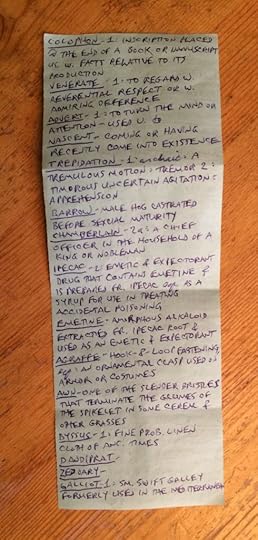building vocab one strip of paper at a time
Many people believe that we think by using language–words. Not me. Indeed, I think it’s easy to show that this idea is not true. In my view, language is a communication technology. But it’s still extremely important, and all the more so if you happen to be, as I am, a writer.
I work continually to build my command of English. One of my methods of doing that is to write down new words as I encounter them in my reading. My bookmarks are blank slips of paper on which I write each new word as I come across it, along with its definition from Merriam-Webster’s Collegiate Dictionary. I have a good supply of these bookmarks, and they get shuffled around as I finish reading one book and start another, so by the time I complete a bookmark it is usually filled with words from a number of different books read over the course of a few years.

Have these words ever had to bunk together like this before?
Okay, here goes:
To give you an idea, I thought I would share the contents of a recently completed bookmark. Most of the words were not new to me in the sense of never having seen them before. My main criterion for adding a word is that it not be in my active vocabulary. I ask myself, “Could I use this word in my own writing right now?” If I lack confidence about that, then I add the word and its definition. When a word has multiple senses, I usually just write down the sense in which it is being used in the book where I found it.
colophon 1: inscription placed at the end of a book or manuscript usually with facts relative to its production
venerate 1: to regard with reverential respect or with admiring deference
advert 1: to turn the mind or attention–used with to
nascent coming or having recently come into existence
trepidation 1: archaic: a tremulous motion: tremor 2: timorous uncertain agitation: apprehension
barrow male hog castrated before sexual maturity
chamberlain 2a: a chief officer in the household of a king or nobleman
ipecac 2: emetic and expectorant drug that contains emetine and is prepared from ipecac especially as a syrup for use in treating accidental poisoning
emetine [yes, sometimes I have to look up words in the definitions too] amorphous alkaloid extracted from ipecac root and used as an emetic and expectorant
agraffe hook-and-loop fastening, especially: an ornamental clasp used on armor or costumes
awn one of the slender bristles that terminate the glumes of the spikelet in some cereal and other grasses
byssus 1: fine probably linen cloth of ancient times
galliot 1: small swift galley formerly used in the Mediterranean
breastwork temporary fortification
baldachin 1: cloth canopy fixed or carried over an important person or a sacred object
rodomontade 2: vain boasting or bluster: rant
shirtwaist woman’s tailored garment (as a blouse or dress) with details copied from men’s shirts
anodyne 1: something that soothes, calms, or comforts; 2: a drug that allays pain
benison blessing, benediction
spavined 2: old and decrepit; over-the-hill
organdy very fine transparent muslin with a stiff finish
linguiça form of smoke-cured pork sausage seasoned with garlic and paprika in Portuguese-speaking countries
selectman one of a board of officials elected in towns of all New England states except Rhode Island to serve as the chief administrative authority of the town
reredos a usually ornamental wood or stone screen or partition wall behind an altar
morris chair easy chair with adjustable back and removable cushions
larrup 2 dialect: to move indolently or clumsily
Parsons table usually rectangular table having straight legs that are flush with the edge of the top
span pair of animals (as mules) usually matched in appearance and action and driven together
That’s my bookmark: both sides. The final step of the process is that I review my bookmark by reading all the entries aloud to myself before recycling it. Formerly I did this in privacy and solitude, but lately I have taken to recording videos of this heart-stopping action and posting them to my Facebook author page. If you think you can handle the excitement, you can watch me read the above list, and see how I grapple with pronunciation.
Going through this process means that often I remember exactly where I learned certain words. If you would like to build your own vocabulary, I warmly recommend this method as one way of doing so.
Did you enjoy this post? Help me create more by becoming one of my Patreon patrons. If you’d like to support my work without spending money, I have just the page for you.
The post building vocab one strip of paper at a time appeared first on Paul Vitols.



